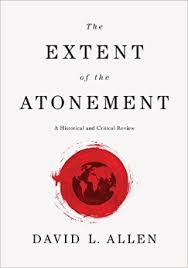The Extent of the Atonement by David Allen. Nashville, TN: B & H Academic, 2016.

The book is nicely divided into three parts. Part One is the extent of the atonement in church history, which contains four chapters: (1.) early and medieval era, (2.) Reformation era, (3.) post-Reformation era, (4.) modern era. Part Two is the extent of the atonement in the Baptist tradition, which is divided into three chapters: (1.) English Baptists, (2.) North American Baptists, and (3.) Southern Baptists. Part Three is called a Critical Review, and it consists of two chapters. The first chapter in this section is a critical review of the book From Heaven He Came and Sought Her, and the last chapter is Allen’s personal conclusion on why a universal atonement is important. And as with all good reference books, it has three indices: (1.) subject, (2.) name, and (3.) Scripture.
The Strengths of the Book
Though this is not the only historical survey of the doctrine of the extent of the atonement, it is the only comprehensive survey of the topic. From Irenaeus (AD 130-202) to David Schrock (b. AD 1980), and with almost every notable theologian in between, Allen has provided us with a valuable catalog of the history of the extent of the atonement. Therefore, I am thankful, first of all, for now having such a resource available for my own study on the subject.
Second, I am thankful that Allen included more than just the most notable theologians. Yes, Calvin, Edwards, and Hodge are given their due attention, but a plethora of other lesser known figures, such as Robert Morrison and Thomas Lamb, are also included in the survey. Getting better acquainted with these men is helpful. This, no doubt, took a lot of time and research, which can now be a benefit to us all.
Third, I am thankful for how Allen represents those with whom he disagrees. As one who holds to a limited atonement view, I never felt like my position was being dragged in the mud. Allen remains respectful throughout the book. I didn’t see any straw men lurking around in the pages either; each scholar seemed to be represented fairly and in his own words.
Fourth, I am thankful that Allen did not bifurcate the historical positions into two over-simplified camps—limited atonement and universal atonement. Allen correctly divides limited atonement advocates into two separate camps: those who believe that universal sufficiency is extrinsic, and those who believe that universal sufficiency is only intrinsic. Beza, Owen, and Perkins believed that the atonement, because of the infinite value of Christ’s deity, could have been (hypothetically) sufficient for all the world, but only if God had intended it to be sufficient for them. Thus, universal sufficiency is not actually (extrinsically) sufficient for the non-elect. Conversely, many 5-point Calvinists, as Allen notes, argued for more than just hypothetical (intrinsic) sufficiency. For the majority of Calvinists, universal sufficiency is extrinsic; the atonement is actually sufficient for the salvation of the non-elect.
For instance, according to the Canons of Dort: “And, whereas many who are called by the gospel do not repent nor believe in Christ, but perish in unbelief, this is not owing to any defect or insufficiency in the sacrifice offered by Christ upon the cross, but is wholly to be imputed to themselves” (2:6). Subsequently, not only does universal (extrinsic) sufficiency provide a warrant for the universal offer of the gospel, it brings greater judgment on those who reject the gospel. As John Calvin stated:
And indeed, our Lord Jesus was offered to all the world… Our Lord Jesus suffered for all and there is neither great nor small who is not inexcusable today, for we can obtain salvation in Him. Unbelievers who turn away from Him and who deprive themselves of Him by their malice are today doubly culpable. For how will they excuse their ingratitude in not receiving the blessing in which they could share by faith? And let us realize that if we come flocking to our Lord Jesus Christ, we shall not hinder one another and prevent Him being sufficient for each of us… Let us not fear to come to Him in great numbers, and each one of us bring his neighbours, seeing that He is sufficient to save us all.1
Moreover, I am thankful that Allen did not lump all Hypothetical Universalists into the Amyraldian camp. It is easy for some to place the hypothetical universalism of John Preston and John Davenant with the hypothetical universalism of Moïse Amyraut, but this would be an oversimplification.
Though Preston, Davenant, and Amyraut believed that the atonement opened the door of salvation for the non-elect, Preston and Davenant believed that God had given the death of Christ a special intention (design) for the elect that made it inherently efficacious for them. In other words, Christ died for all, but He did not die equally for all. For Preston and Davenant, there is something within the death of Christ itself that makes it inherently efficacious only for the elect. The atonement, by its special design, secured its own application for the elect alone.
Conversely, 4-point Calvinists believe there is nothing inherent within the atonement itself that limits its efficacy to the elect. In sum, they deny that the atonement has any objective efficacy at all.
For this reason, the hypothetical universalism of Preston and Davenant remains within the boundaries of the Cannons of Dort, while the hypothetical universalism of 4-point Calvinists remains outside of those boundaries.
The Weaknesses of the Book
Along with disagreeing with Allen’s view on universal atonement, I see seven noteworthy weaknesses.
Stealing Our Men
One, I believe Allen wrongly considers too many 5-point Calvinists as 4-point Calvinists, most notably Thomas Boston, Jonathan Edwards, Andrew Fuller, and Charles Hodge.2 These men, according to Allen, believed in universal atonement.
By way of proof, He spends a lot of time demonstrating that these men believed that the atonement is actually (extrinsically) sufficient for the salvation of all people. This is true of these men. And it is also true, as Allen pointed out, that these men rooted the free offer of the gospel in the universal sufficiency of the death of Christ. Allen provides one quote after another where these men make such statements.
But providing one quote or a thousand quotes that reinforce the idea that the atonement is actually (extrinsically) sufficient for the salvation of all people does not necessarily imply that these men rejected the doctrine of limited atonement. Boston, Fuller, and Hodge not only believed in (actual) universal sufficiency, they also believed in limited efficacy. As with the Canons of Dort, they held to the Lombardian formula—limited efficacy and universal sufficiency.
Thomas Boston held to both sides of the Lombardian formula: “Though Christ died only in the room and stead of his elect, on the cross sustaining their persons only, according to what John 10:15, ‘I lay down my life for the sheep;’ yet the price paid for them being of infinite worth, was sufficient in itself to save the whole world.”3
Jonathan Edwards also held to both sides of the Lombardian formula:
Christ in some sense may be said to die for all, and to redeem all visible Christians, yea, the whole world, by his death; yet there must be something particular in the design of his death, with respect to such as he intended should actually be saved thereby.4
For Edwards, what makes the atonement unique for the elect is that it effectually secured their salvation. He believed that Christ came to die for the special purpose of redeeming His people from their sins:
Now can we suppose that Christ came down from heaven and went through all this upon uncertainties, not knowing what purchase he should get, how great or how small? Did he die only upon probabilities, without absolute certainty who, or how many, or whether any should be redeemed by what he did and suffered?5
Though Allen is right in saying Charles Hodge believed in the universal sufficiency side of the Lombardian formula, Allen fails to stress that Hodge also believed in the limited efficacy side of the formula as well: “It follows,” Hodge claimed: “from the nature of the covenant of redemption, as presented in the Bible, that Christ did not die equally for all mankind, but that He gave Himself for his people and for their redemption.”6
So, it seems strange to remove these men from the limited atonement camp when their positions are safely within the orthodoxy of the Canons of Dort.
Misses the Main Distinctive of Limited Atonement
The second weakness is based on the first weakness. Allen fails to acknowledge that the main distinctive of particular redemption is the doctrine of limited efficacy. Allen, however, claims the opposite. “The question of the universal sufficiency of the atonement,” according to Allen, “is actually the key issue in the debate over the extent of the atonement.”7 He makes it abundantly clear that he thinks that the debate over the extent of the atonement centers on the extent of the atonement’s sufficiency:
We will see that the debate over the nature of this sufficiency beginning in the early seventeenth century is the key debate in the extent question. One often hears statements by Calvinists that “the debate is not over the sufficiency of the atonement: all agree the atonement was sufficient to atone for the sins of the whole world.” However, the debate is very much about the nature of the sufficiency of Christ’s death.8
Yet, this is where Allen goes wrong. There are many advocates of limited atonement who do not believe in limited sufficiency as exposed by Beza, Owen, and Perkins. Beza, Owen, and Perkins, however, do not represent all limited atonement advocates. In fact, Allen acknowledges, in multiple places, that there is a difference of opinion among limited atonement advocates on the extent of sufficiency. Is the atonement intrinsically (hypothetically) or extrinsically (actually) sufficient for the non-elect? This question is answered differently by those holding to limited atonement. And, Allen is right in pointing out that intrinsic (hypothetical) sufficiency, held by Beza, Perkins, and Owen, has been the minority position among 5-point Calvinists.
And if this is the case, then limited atonement is not ultimately about the extent of its sufficiency. What determines if someone believes in limited atonement or not (at least as limited atonement is defined by the Canons of Dort), is determined by whether that person believes in the limited extent of the atonement’s efficacy or not.
Limited efficacy is the one thing all advocates of limited atonement have in common. Beza, Perkins, Owen, Boston, Edwards, Fuller, and Hodge (with every other 5-point Calvinist) believed that the atonement secured its own application for the elect and for the elect alone. They may differ on the nature and the extent of sufficiency, but they all whole heartily agree on the nature and the extent of its saving efficacy.
Thus, limited efficacy (not limited sufficiency) is what makes the atonement limited. Allen failed to make, or at least failed to stress, this crucial point.
Oversimplification of the Nature of the Extent of the Atonement
Third, by failing to highlight this important distinction, Allen oversimplifies the nature of the extent of the atonement. According to Allen, “There are only two options: (1) for the elect alone (limited atonement) or (2) for all of humanity.”9 But for most 5-point Calvinists, this is a false bifurcation.
For Allen, the extent of the atonement only touches the extent of its actual (extrinsic) sufficiency. Yet, the extent of the atonement is more complicated than just determining the extent of the atonement’s sufficiency. There are two sides to the extent of the atonement: (1.) the extent of its extrinsic sufficiency, and (2.) the extent of its inherent efficacy.
Allen is mistaken when he limits the extent to sufficiency alone. He is wrong when he says: “For all who affirm limited atonement, the atonement can only be sufficient for those for whom it is efficient.” This is not true for the majority of 5-point Calvinists who have affirmed that actual (extrinsic) sufficiency extends to all universally.
Consequently, the extent of the atonement includes more than just its sufficiency. For 5-point Calvinists, limited atonement means limited efficacy. Thus, to disprove limited atonement, as it is presented in the Canons of Dort, Allen has to do more than disprove the limited extent of its actual sufficiency. Allen has to do something more difficult, he has to disprove the limited extent of its inherent efficacy. Without making the distinction between the two sides of the extent of the atonement, Allen muddies the waters a bit. And this, I think, is a real weakness in the book.
Lack of Attention Given to Limited Efficacy
Fourth, Allen seems to imply that limited efficacy is something that is agreed upon by both Calvinists and Arminians. For Allen, limited efficacy simply means “limited at the point of application.”11 When he introduces the Lombardian formula of Peter Lombard, he defines the meaning of limited efficacy as “the benefits of the atonement were only applied to the elect (those who believe).”12 Allen reaffirms that this is his understanding of the Lombardian formula at the end of the book: “Christ died for the sins of all but was only applied to those who believed (the elect).”13 In other places he seems to imply limited efficacy is merely to be understood as limited application, and limited application is something “all Calvinists and non-Calvinists affirm.”14
Yet, limited application is not what Peter Lombard meant by limited efficacy. Lombard stated: “[Christ] offered himself on the altar of the cross not to the devil, but to the triune God, and he did so for all with regard to the sufficiency of the price, but only for the elect with regard to its efficacy, because he brought about salvation only for the predestined.”15 Lombard is speaking about the objective, not the subjective side of the death of Christ. More precisely, Lombard is speaking about what the death of Christ objectively accomplished. According to Lombard, the cross accomplished universal (extrinsic) sufficiency for all, and it “brought about salvation only for the predestined” due to its “efficacy.”
The efficacy of the atonement is the atonement’s inherent power to bring about its own application. It is not just the idea of application, it is idea of self-application. Redemption was accomplished on the cross and it does not need any extra grace or power (that was not already purchased by Christ on the cross) for it to be applied. Rather, the grace and power that was secured by the death of Christ effectually procured its own application.
Of course there is a chronological distinction between redemption accomplished and redemption applied, but for those holding to limited efficacy, it is impossible for there to be one without the other. This is because the atonement effects its own application. And if the atonement secures its own application, then the extent of this inherent power (efficacy) has to be limited to only those who will finally be redeemed by this power. Again, limited efficacy, which is inherent within the atonement itself, is the true nature of limited atonement.
Even if Owen was Wrong, It Does Not Disprove Limited Efficacy
Fifth, Allen seems to think by disproving Owen’s trilemma argument,16 which is based on a quantitative (idem) punishment, that he effectively removes any inherent efficacy within the cross itself.17
According to Owen, if the saving benefits are only applied to the elect, then only the sins of the elect were applied to Christ on the cross. Thus, Owen concluded that Christ paid for the exact sins (idem) of only those in whom His death secured saving faith—the elect. As Owen stated:
It was a full, valuable compensation, made to the justice of God, for all the sins of all those for whom he made satisfaction, by undergoing that same (idem) punishment which, by reason of the obligation that was upon them, they themselves were bound to undergo. When I say the same, I mean essentially the same in weight and pressure, though not in all accident of duration and the like.18
Because Owen believed that the atonement was a quantitative (idem) rather than a qualitative (tantundem) punishment, he logically concluded that the death of Christ has to be inherently efficacious. Or otherwise God would be requiring a double payment for the sins of those who are condemned to hell.
And if the cross is inherently efficacious, then Owen was right—the atonement secured its own application for only those whose sins were imputed to Christ on the cross. For Owen, therefore, what makes the atonement inherently efficacious is the idea that Christ made a quantitative (idem) payment for sin, rather than a qualitative (tantundem) payment. Of course, this line of reasoning is what caused Owen, and other High Calvinists, to reject (extrinsic) universal sufficiency.
Allen is right in stating that many Moderate Calvinists, such as Boston, Fuller, and Hodge, disagreed with Owen on this particular issue. By holding to an extrinsic and universal sufficiency, they denied that the death of Christ was a quantitative (idem) payment for sin. According to Boston, Fuller, and Hodge, the atonement had to be actually sufficient for all since the gospel is a sincere offer to all. And for the atonement actually to be sufficient for all, the atonement has to be a qualitative (tantundem), rather than a quantitative (idem) payment for sins. As Hodge himself explained:
It is a gross misrepresentation of the Augustinian doctrine to say that it teaches that Christ suffered so much for so many; that He would have suffered more had more been included in the purpose of salvation. This is not the doctrine of any Church on earth, and never has been. What was sufficient for one was sufficient for all…. All that Christ did and suffered would have been necessary had only one human soul been the object of redemption; and nothing different and nothing more would have been required had every child of Adam been saved through his blood.19
But, even though Boston, Fuller, and Hodge disagreed with Owen, their disagreement does not mean that they denied limited efficacy. In other words, proving that these men (Boston, Fuller, and Hodge) believed in universal (actual) sufficiency does not prove that these men denied that the cross effectually secured its own application.
Hodge, for instance, believed that the limited efficacy of the cross is rooted in the Covenant of Redemption. According to Hodge, Christ in eternity past became the federal head of His chosen people. Or in the words of Hodge:
The Bible teaches, (1.) That a certain portion of the human race was given to Christ. (2.) That they were given to Him before the foundation of the world. (3.) That all thus given to Him will certainly come to Him and be saved. (4.) That this union, so far as it was from eternity, is not a union of nature, nor by faith, nor by indwelling of the Holy Spirit, it was a federal union. (5.) That Christ, therefore, was a federal head and representative of those given to Him.20
“It follows,” Hodge claimed: “from the nature of the covenant of redemption, as presented in the Bible, that Christ did not die equally for all mankind, but that He gave Himself for His people and for their redemption.”21 Because of the elect’s federal union with Christ, according to Hodge, “What He did and suffered in their place, or as their representative, they in the eye of the law, did and suffered.”22 “He was therefore the federal head,” according to Hodge, “not of the human race, but of those given to Him by the Father. And therefore, His work, so far as its main design is concerned, was for them alone. Whatever reference it had to others was subordinate and incidental.”23
Therefore, Christ’s legal representation of His chosen people in the eternal covenant of redemption is the reason the death of Christ is efficacious for only the elect—securing saving faith for them and for them alone. This is because when Christ died, those who were in legal union with Him died with Him. Because Christ and His people were considered one in the eyes of God, their sins (in a qualitative sense) were imputed to Christ as He bore the wrath they deserved on the tree.
Most other 5-point Calvinists believe that the atonement secured its own application by the special intention or design of God. That is, God caused the cross to be inherently efficacious because that is how He designed or intended for the cross to operate.
But, regardless of what causes the cross to secure its own application, disproving Owen’s reason for self-efficacy does not disprove the other possible reasons for the atonement’s self-application. And, if the cross secured its own application, then the extent of its efficacy must be limited to the elect and to the elect alone.
A Misunderstanding of the Gift of Faith
Sixth, Allen claims that faith was not procured by the death of Christ. In his critique of John Piper’s chapter in From Heaven He Came and Sought Her, Allen states:
Piper cannot demonstrate anywhere from Scripture the notion that faith is something ‘purchased’ for the elect at the cross. Such language finds no support in the NT. Where Owen and Piper err is in thinking that faith as a gift is equivalent to faith as a purchase. There is no causal link between the death of Christ and subjective faith.24
Yet, those holding to limited atonement do not build the case for limited efficacy on a proof text. Rather, as Calvinists, they understand that saving faith is connected with the new nature. Saving faith is not a gift that comes by itself. Faith comes by hearing, and hearing comes by the Word of God, and this by spiritual illumination that is connected with a saving work within the heart of man. In other words, without the Spirit’s saving work within man, there is no saving faith.
And, though the Bible does not directly say faith was procured by the death of Christ, it does teach that the new nature was procured by the death of Christ. For Christ “gave Himself for us to redeem us from every lawless deed, and to purify for Himself a people for His own possession, zealous for good deeds” (Titus 2:14). And it is said that Christ died that “he might sanctify the people with his own blood” (Hebrews 13:12). These, and other such verses, teach that Christ’s death did more than make men savable.
There is a “causal link” between faith and the atonement because there is a “causal link” between the death of Christ and the new nature and a “causal link” between the new nature and saving faith. For the elect, the death of Christ effectually secured and brought about the new nature. And, this is the reason the atonement secured saving faith, and thus the reason the atonement is limited in the extent of its saving efficacy.
Disjoining Intent, Extent, and Application
Seventh, Allen rightly distinguishes between intent and extent, but wrongly denies there is a necessary connection between them. He charges 5-point Calvinists with conflating (1) intent, (2) extent, and (3) application together. “High Calvinists,” according to Allen, “presume that the intent to apply and the extent are and must be coextensive.”25
For instance, in his introduction, Allen claims that Calvinists, such as A. A. Hodge and Louis Berkhof, confused intent with extent. According to Allen, the question of the extent of the atonement is not the same as asking the question of the intent or the question of the application of the atonement:
It is surprising how often those on both sides of the theological fence don’t seem to understand the actual state of the question. For example, A. A. Hodge stated: “The question does truly and only relate to the design of the Father and of the Son in respect to the persons for whose benefit the Atonement was made.” But stating the question in this fashion fails to reckon with the distinction between the intent and extent of the atonement.
Louis Berkhof saw the question to be “Did the Father in sending Christ, and did Christ coming into the world, to make atonement for sin, do this with the design or for the purpose of saving only the elect or all men? That is the question, and that only is the question.” Again, Berkhof fails to distinguish between views on the intent of the atonement and the actual issue of its extent.26
Even if there were a special intent for the elect, according to Allen, what does this have to do with the extent of the atonement. Just because God may have had a special intent to save the elect, this, argues Allen, does not rule out that the atonement’s universal (extrinsic) sufficiency for all. For Allen, intent is asking the question of application, while extent is asking the question of sufficiency.
Intent = Efficacy/Application
Extent = Sufficiency
So, according to Allen, the question of (1.) intent is connected to the question of (3.) application, but not connected with the question of (2.) extent.
Yet, Hodge and Berkhof were not wrong in connecting intent with extent. Although Calvinists believe there is a distinction between intent, extent, and application, it is not inconsistent for them to believe that there is a necessary connection between them. For instance, it is the special (1.) intent (or design) of the atonement that causes it to secure its own application, and the atonement’s self-application necessitates that the (2.) extent of its efficacy (not sufficiency) is limited to the elect, and the limited extent of its efficacy is the reason the atonement is (3.) applied to only the elect. So, at least for 5-point Calvinists, it is impossible for there to be one (intent, extent, or application) without the other two.
Conclusion
Allen is extremely helpful in showing the complexities of the extent of the atonement within the Reformed and Baptist traditions. Yet, because he failed to nuance the two dimensions of the extent of the atonement (the extent of efficacy and the extent of sufficiency), the book is a little misleading. I don’t believe he accomplished his objective in disproving limited atonement by building a strong case for universal sufficiency. I agree that Calvin, Edwards, Boston, Fuller, Hodge, and many other Calvinists believed that the death of Christ has sufficiently opened the door of salvation for everyone, and that this universal (extrinsic) sufficiency makes the gospel a sincere and warranted offer to all. Yet, even if Calvin, Edwards, Boston, Fuller, and Hodge were right, this in no way cancels out the limited intent and the limited extent of the atonement’s inherent efficacy. To disprove limited atonement, Allen has to prove that the atonement did not effectually purchase, redeem, and purify a particular people for God. Which I believe Allen failed to do.
Much more could be said about both the strengths and weaknesses of this book. Having such a vast amount of research at my fingertips, I can see myself using it consistently as a handy reference tool. And regardless of whether we agree or disagree with Allen’s critical conclusions, I believe we will all agree that he has written a valuable book.
NOTES:
1 Calvin, Sermons on Isaiah 53, T.H.L. Parker (London: Clarke, 1956), 141. Italics added.
2 I would argue for John Calvin as well.
3 Thomas Boston, “Christ Saviour of the World” in The Complete Works of Thomas Boston (Stoke-on-Trent, UK: Tentmaker, 2002) 6:299.
4 Jonathan Edwards, The Freedom of the Will (Edinburgh: Banner of Truth, 1996), 328–329.
5 Jonathan Edwards, in Works of Jonathan Edwards Online, 73 vols., ed. H.S. Stout (Jonathan Edwards Center, Yale University, 2008), 13:212.
6 Ibid., 547.
7 Ibid., 623, italics is his.
8 Ibid., 31.
9 The Extent of the Atonement, xxi.
10 Ibid., 775. Italics mine.
11 Ibid., 623.
12 Ibid., 27.
13 Ibid., 667.
14 Ibid., 27.
15 The Sentences, Book 3: On the Incarnation of the Word, trans. Giulio Silano (Toronto: Pontifical Institute of Mediaeval Studies, 2008), 86 (3.20.5).
16 Owen argued that Christ either suffered for (1.) all of the sins of some people, or (2.) all of the sins of all people, or (3.) some of the sins of all people.
17 See Allen, The Extent of the Atonement, 627–629.
18 Death of Death in the Death of Christ, 157–158.
19 Charles Hodge, Systematic Theology (Grand Rapides: Eerdmans, 1981), 2:544–545.
20 Ibid., 2:551.
21 Ibid., 2:547.
22 Ibid., 2:551.
23 Ibid.
24 The Extent of the Atonement, 758.
25 Ibid., 267.
26 Ibid., xxiii., Italics his.






















